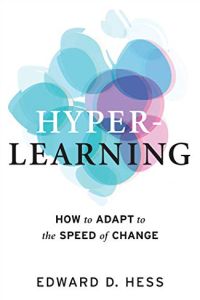Зарегистрируйтесь на getAbstract, чтобы получить доступ к этому краткому изложению.

Зарегистрируйтесь на getAbstract, чтобы получить доступ к этому краткому изложению.
Edward D. Hess
Hyper-Learning
How to Adapt to the Speed of Change
Berrett-Koehler, 2020
Что внутри?
Adopt this useful program to develop powerful learning habits for yourself and your team.
Recommendation
Quickening disruption is inevitable as AI and machines invade work that people once routinely performed, writes business professor Edward D. Hess. To help workers deal with this development, Hess prescribes lifelong learning, unlearning and relearning focused on creativity, collaboration and critical thinking – which people still do better than machines. His approach to learning is holistic, marrying mind, body and spirit – and it’s based on hundreds of journal articles, books and 17 years of teaching experience. Hess also offers numerous thought experiments, assessments and journaling exercises.
Summary
About the Author
Edward D. Hess is Professor Emeritus of Business Administration, Darden School of Business, University of Virginia. He is the author of 13 books, including Humility Is the New Smart, Learn or Die and Smart Growth.






















Comment on this summary